Cultural Diversity in Tourism and Hospitality: A Business Analysis
VerifiedAdded on 2020/03/04
|9
|2064
|130
Report
AI Summary
This report examines the crucial role of cultural diversity in the tourism and hospitality industry. It highlights how globalization increases cultural diversity, impacting customer service, staffing, and overall business success. The report discusses the importance of understanding different cultures to provide better service, avoid mistakes, and increase customer retention. It also explores the benefits of a culturally diverse workforce, including innovation, competitive advantage, and improved customer satisfaction. Furthermore, it emphasizes the consequences of neglecting cultural diversity, such as a monoculture environment, loss of customers, and decreased brand value. The report concludes with recommendations for companies to embrace cultural diversity through training, diverse hiring practices, and themed events to attract customers and thrive in a competitive market. The report uses references from various academic sources to support its arguments.
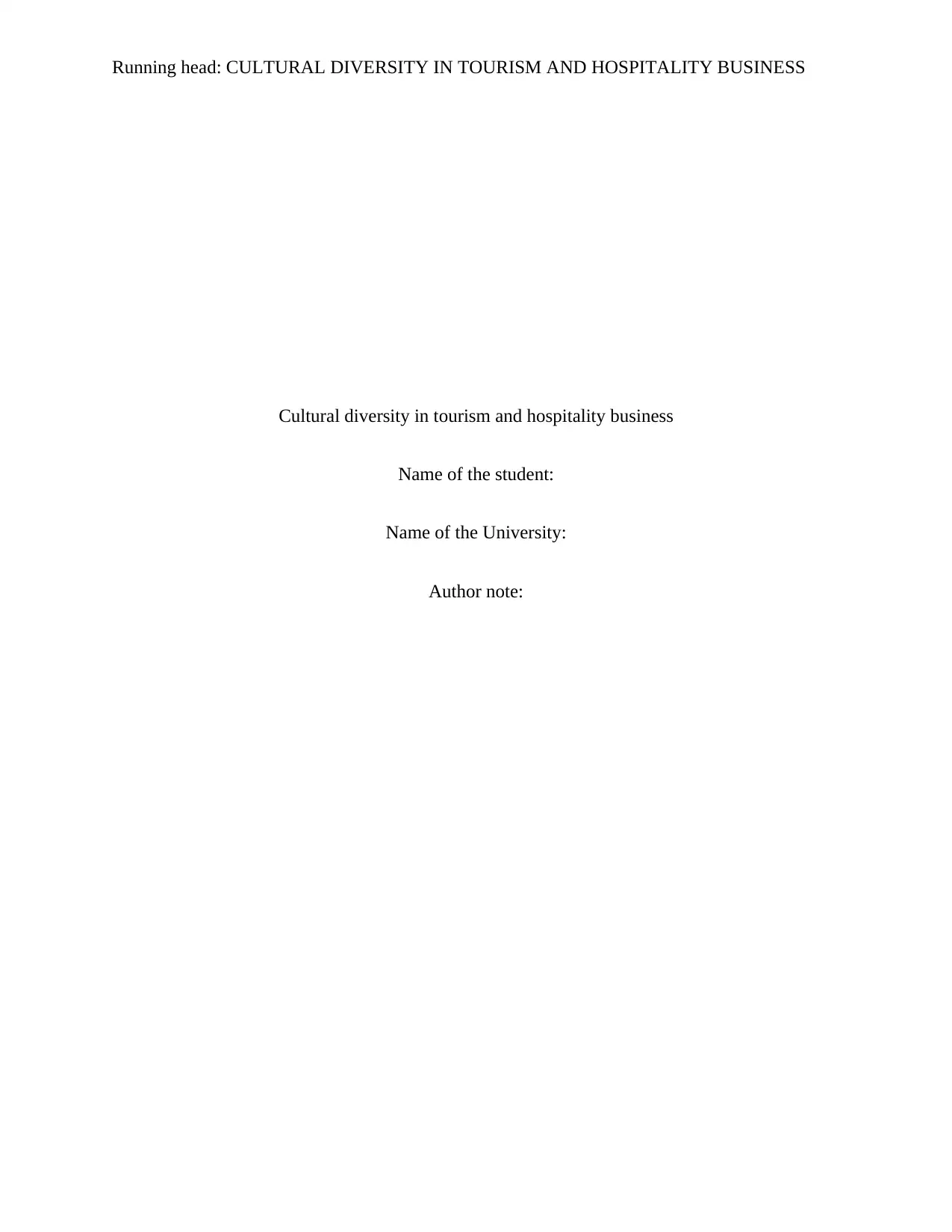
Running head: CULTURAL DIVERSITY IN TOURISM AND HOSPITALITY BUSINESS
Cultural diversity in tourism and hospitality business
Name of the student:
Name of the University:
Author note:
Cultural diversity in tourism and hospitality business
Name of the student:
Name of the University:
Author note:
Paraphrase This Document
Need a fresh take? Get an instant paraphrase of this document with our AI Paraphraser
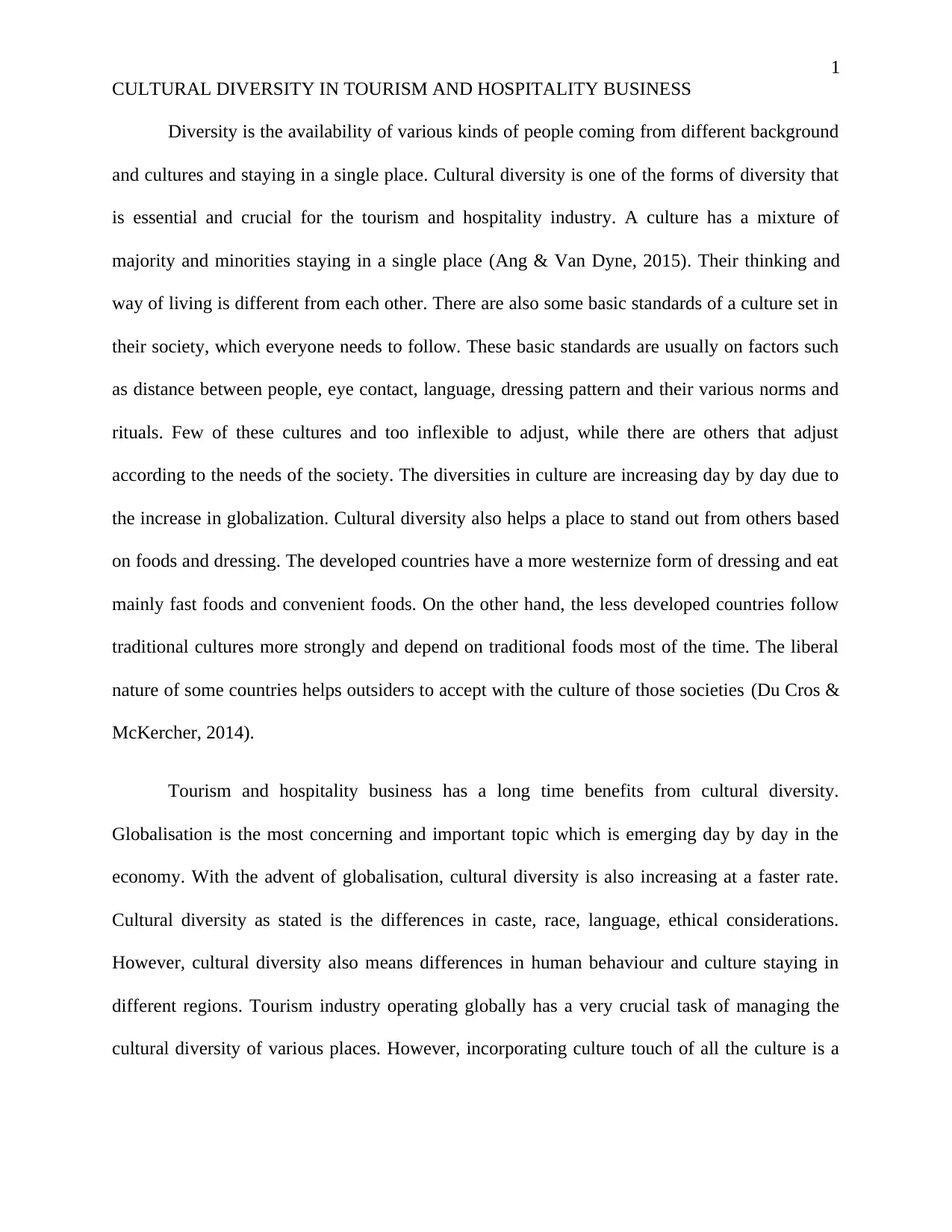
1
CULTURAL DIVERSITY IN TOURISM AND HOSPITALITY BUSINESS
Diversity is the availability of various kinds of people coming from different background
and cultures and staying in a single place. Cultural diversity is one of the forms of diversity that
is essential and crucial for the tourism and hospitality industry. A culture has a mixture of
majority and minorities staying in a single place (Ang & Van Dyne, 2015). Their thinking and
way of living is different from each other. There are also some basic standards of a culture set in
their society, which everyone needs to follow. These basic standards are usually on factors such
as distance between people, eye contact, language, dressing pattern and their various norms and
rituals. Few of these cultures and too inflexible to adjust, while there are others that adjust
according to the needs of the society. The diversities in culture are increasing day by day due to
the increase in globalization. Cultural diversity also helps a place to stand out from others based
on foods and dressing. The developed countries have a more westernize form of dressing and eat
mainly fast foods and convenient foods. On the other hand, the less developed countries follow
traditional cultures more strongly and depend on traditional foods most of the time. The liberal
nature of some countries helps outsiders to accept with the culture of those societies (Du Cros &
McKercher, 2014).
Tourism and hospitality business has a long time benefits from cultural diversity.
Globalisation is the most concerning and important topic which is emerging day by day in the
economy. With the advent of globalisation, cultural diversity is also increasing at a faster rate.
Cultural diversity as stated is the differences in caste, race, language, ethical considerations.
However, cultural diversity also means differences in human behaviour and culture staying in
different regions. Tourism industry operating globally has a very crucial task of managing the
cultural diversity of various places. However, incorporating culture touch of all the culture is a
CULTURAL DIVERSITY IN TOURISM AND HOSPITALITY BUSINESS
Diversity is the availability of various kinds of people coming from different background
and cultures and staying in a single place. Cultural diversity is one of the forms of diversity that
is essential and crucial for the tourism and hospitality industry. A culture has a mixture of
majority and minorities staying in a single place (Ang & Van Dyne, 2015). Their thinking and
way of living is different from each other. There are also some basic standards of a culture set in
their society, which everyone needs to follow. These basic standards are usually on factors such
as distance between people, eye contact, language, dressing pattern and their various norms and
rituals. Few of these cultures and too inflexible to adjust, while there are others that adjust
according to the needs of the society. The diversities in culture are increasing day by day due to
the increase in globalization. Cultural diversity also helps a place to stand out from others based
on foods and dressing. The developed countries have a more westernize form of dressing and eat
mainly fast foods and convenient foods. On the other hand, the less developed countries follow
traditional cultures more strongly and depend on traditional foods most of the time. The liberal
nature of some countries helps outsiders to accept with the culture of those societies (Du Cros &
McKercher, 2014).
Tourism and hospitality business has a long time benefits from cultural diversity.
Globalisation is the most concerning and important topic which is emerging day by day in the
economy. With the advent of globalisation, cultural diversity is also increasing at a faster rate.
Cultural diversity as stated is the differences in caste, race, language, ethical considerations.
However, cultural diversity also means differences in human behaviour and culture staying in
different regions. Tourism industry operating globally has a very crucial task of managing the
cultural diversity of various places. However, incorporating culture touch of all the culture is a
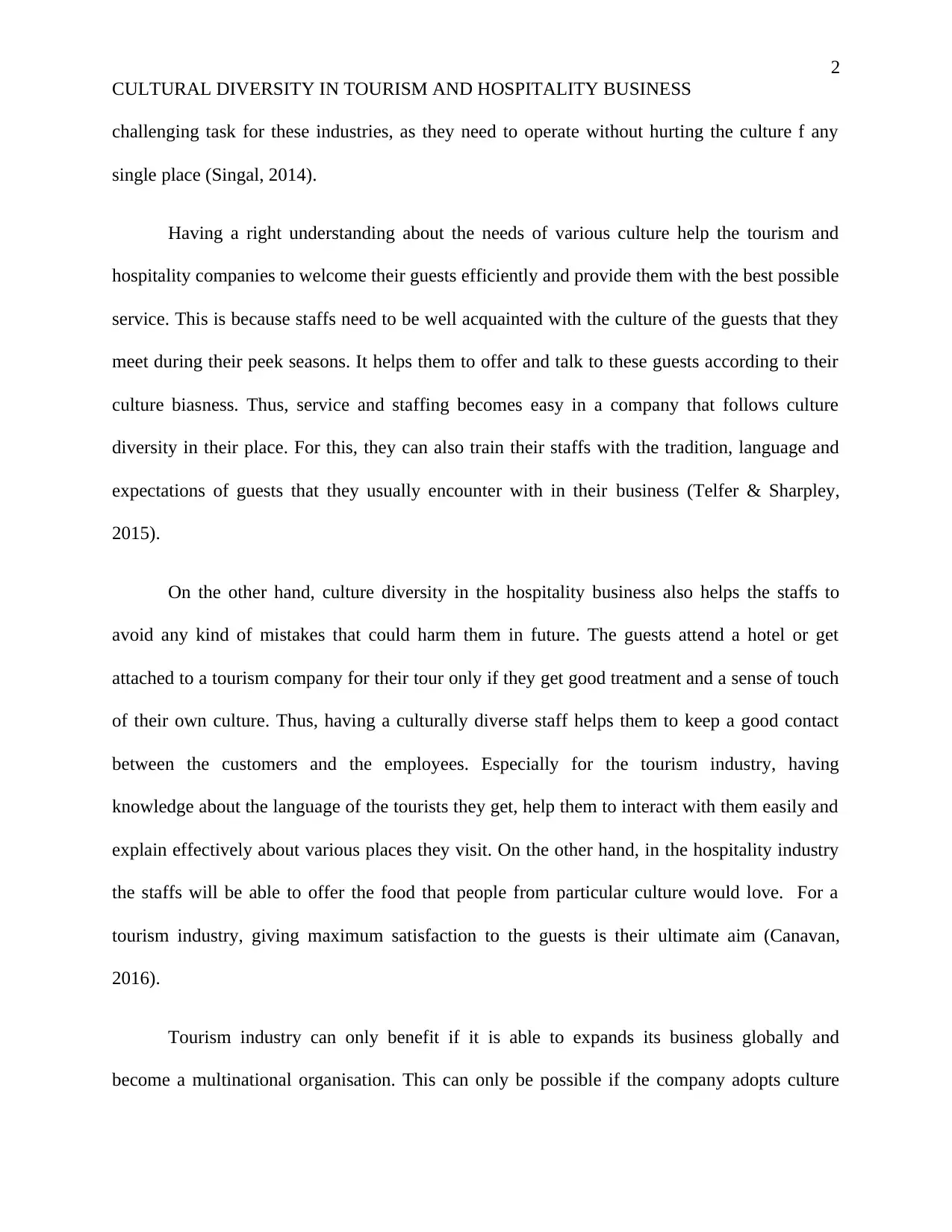
2
CULTURAL DIVERSITY IN TOURISM AND HOSPITALITY BUSINESS
challenging task for these industries, as they need to operate without hurting the culture f any
single place (Singal, 2014).
Having a right understanding about the needs of various culture help the tourism and
hospitality companies to welcome their guests efficiently and provide them with the best possible
service. This is because staffs need to be well acquainted with the culture of the guests that they
meet during their peek seasons. It helps them to offer and talk to these guests according to their
culture biasness. Thus, service and staffing becomes easy in a company that follows culture
diversity in their place. For this, they can also train their staffs with the tradition, language and
expectations of guests that they usually encounter with in their business (Telfer & Sharpley,
2015).
On the other hand, culture diversity in the hospitality business also helps the staffs to
avoid any kind of mistakes that could harm them in future. The guests attend a hotel or get
attached to a tourism company for their tour only if they get good treatment and a sense of touch
of their own culture. Thus, having a culturally diverse staff helps them to keep a good contact
between the customers and the employees. Especially for the tourism industry, having
knowledge about the language of the tourists they get, help them to interact with them easily and
explain effectively about various places they visit. On the other hand, in the hospitality industry
the staffs will be able to offer the food that people from particular culture would love. For a
tourism industry, giving maximum satisfaction to the guests is their ultimate aim (Canavan,
2016).
Tourism industry can only benefit if it is able to expands its business globally and
become a multinational organisation. This can only be possible if the company adopts culture
CULTURAL DIVERSITY IN TOURISM AND HOSPITALITY BUSINESS
challenging task for these industries, as they need to operate without hurting the culture f any
single place (Singal, 2014).
Having a right understanding about the needs of various culture help the tourism and
hospitality companies to welcome their guests efficiently and provide them with the best possible
service. This is because staffs need to be well acquainted with the culture of the guests that they
meet during their peek seasons. It helps them to offer and talk to these guests according to their
culture biasness. Thus, service and staffing becomes easy in a company that follows culture
diversity in their place. For this, they can also train their staffs with the tradition, language and
expectations of guests that they usually encounter with in their business (Telfer & Sharpley,
2015).
On the other hand, culture diversity in the hospitality business also helps the staffs to
avoid any kind of mistakes that could harm them in future. The guests attend a hotel or get
attached to a tourism company for their tour only if they get good treatment and a sense of touch
of their own culture. Thus, having a culturally diverse staff helps them to keep a good contact
between the customers and the employees. Especially for the tourism industry, having
knowledge about the language of the tourists they get, help them to interact with them easily and
explain effectively about various places they visit. On the other hand, in the hospitality industry
the staffs will be able to offer the food that people from particular culture would love. For a
tourism industry, giving maximum satisfaction to the guests is their ultimate aim (Canavan,
2016).
Tourism industry can only benefit if it is able to expands its business globally and
become a multinational organisation. This can only be possible if the company adopts culture
⊘ This is a preview!⊘
Do you want full access?
Subscribe today to unlock all pages.

Trusted by 1+ million students worldwide
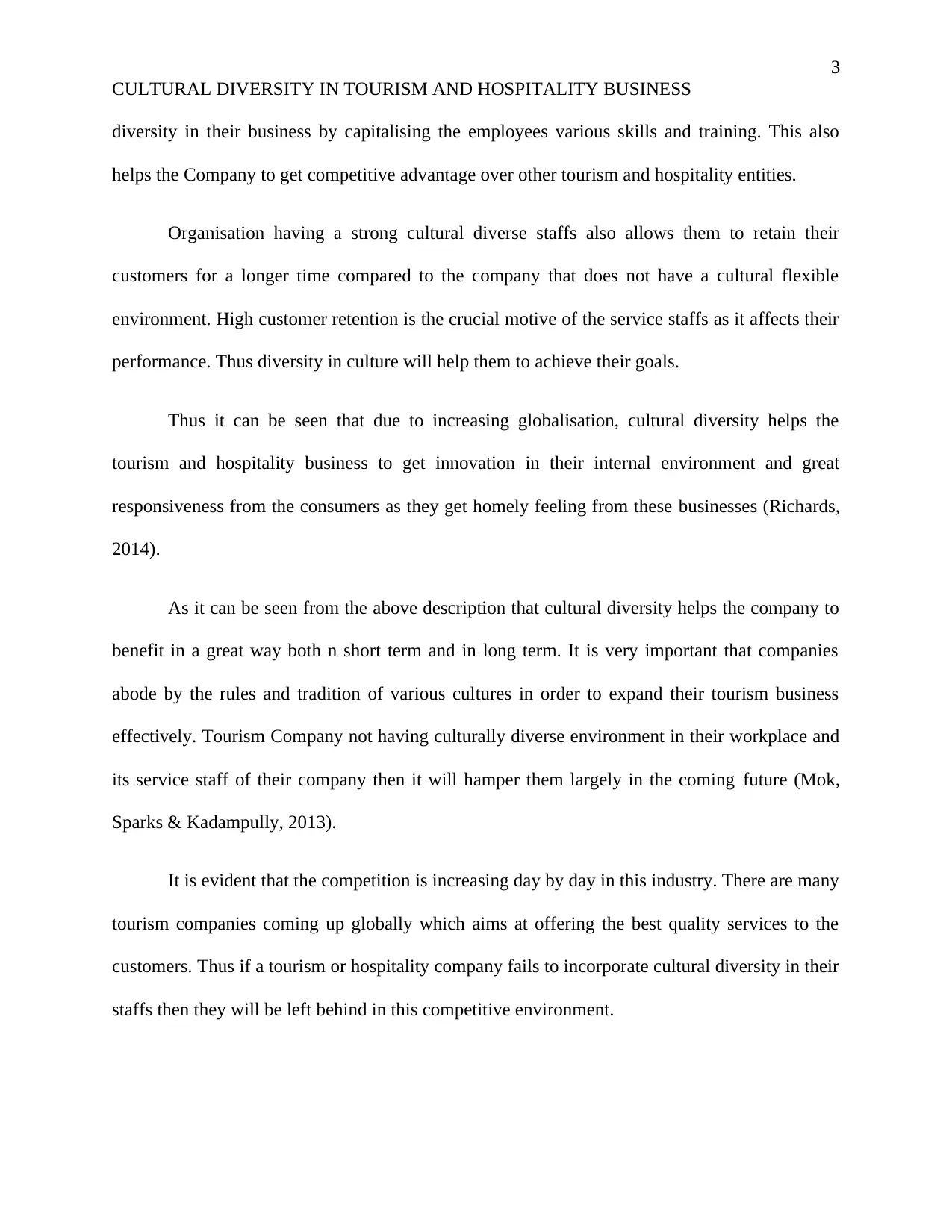
3
CULTURAL DIVERSITY IN TOURISM AND HOSPITALITY BUSINESS
diversity in their business by capitalising the employees various skills and training. This also
helps the Company to get competitive advantage over other tourism and hospitality entities.
Organisation having a strong cultural diverse staffs also allows them to retain their
customers for a longer time compared to the company that does not have a cultural flexible
environment. High customer retention is the crucial motive of the service staffs as it affects their
performance. Thus diversity in culture will help them to achieve their goals.
Thus it can be seen that due to increasing globalisation, cultural diversity helps the
tourism and hospitality business to get innovation in their internal environment and great
responsiveness from the consumers as they get homely feeling from these businesses (Richards,
2014).
As it can be seen from the above description that cultural diversity helps the company to
benefit in a great way both n short term and in long term. It is very important that companies
abode by the rules and tradition of various cultures in order to expand their tourism business
effectively. Tourism Company not having culturally diverse environment in their workplace and
its service staff of their company then it will hamper them largely in the coming future (Mok,
Sparks & Kadampully, 2013).
It is evident that the competition is increasing day by day in this industry. There are many
tourism companies coming up globally which aims at offering the best quality services to the
customers. Thus if a tourism or hospitality company fails to incorporate cultural diversity in their
staffs then they will be left behind in this competitive environment.
CULTURAL DIVERSITY IN TOURISM AND HOSPITALITY BUSINESS
diversity in their business by capitalising the employees various skills and training. This also
helps the Company to get competitive advantage over other tourism and hospitality entities.
Organisation having a strong cultural diverse staffs also allows them to retain their
customers for a longer time compared to the company that does not have a cultural flexible
environment. High customer retention is the crucial motive of the service staffs as it affects their
performance. Thus diversity in culture will help them to achieve their goals.
Thus it can be seen that due to increasing globalisation, cultural diversity helps the
tourism and hospitality business to get innovation in their internal environment and great
responsiveness from the consumers as they get homely feeling from these businesses (Richards,
2014).
As it can be seen from the above description that cultural diversity helps the company to
benefit in a great way both n short term and in long term. It is very important that companies
abode by the rules and tradition of various cultures in order to expand their tourism business
effectively. Tourism Company not having culturally diverse environment in their workplace and
its service staff of their company then it will hamper them largely in the coming future (Mok,
Sparks & Kadampully, 2013).
It is evident that the competition is increasing day by day in this industry. There are many
tourism companies coming up globally which aims at offering the best quality services to the
customers. Thus if a tourism or hospitality company fails to incorporate cultural diversity in their
staffs then they will be left behind in this competitive environment.
Paraphrase This Document
Need a fresh take? Get an instant paraphrase of this document with our AI Paraphraser
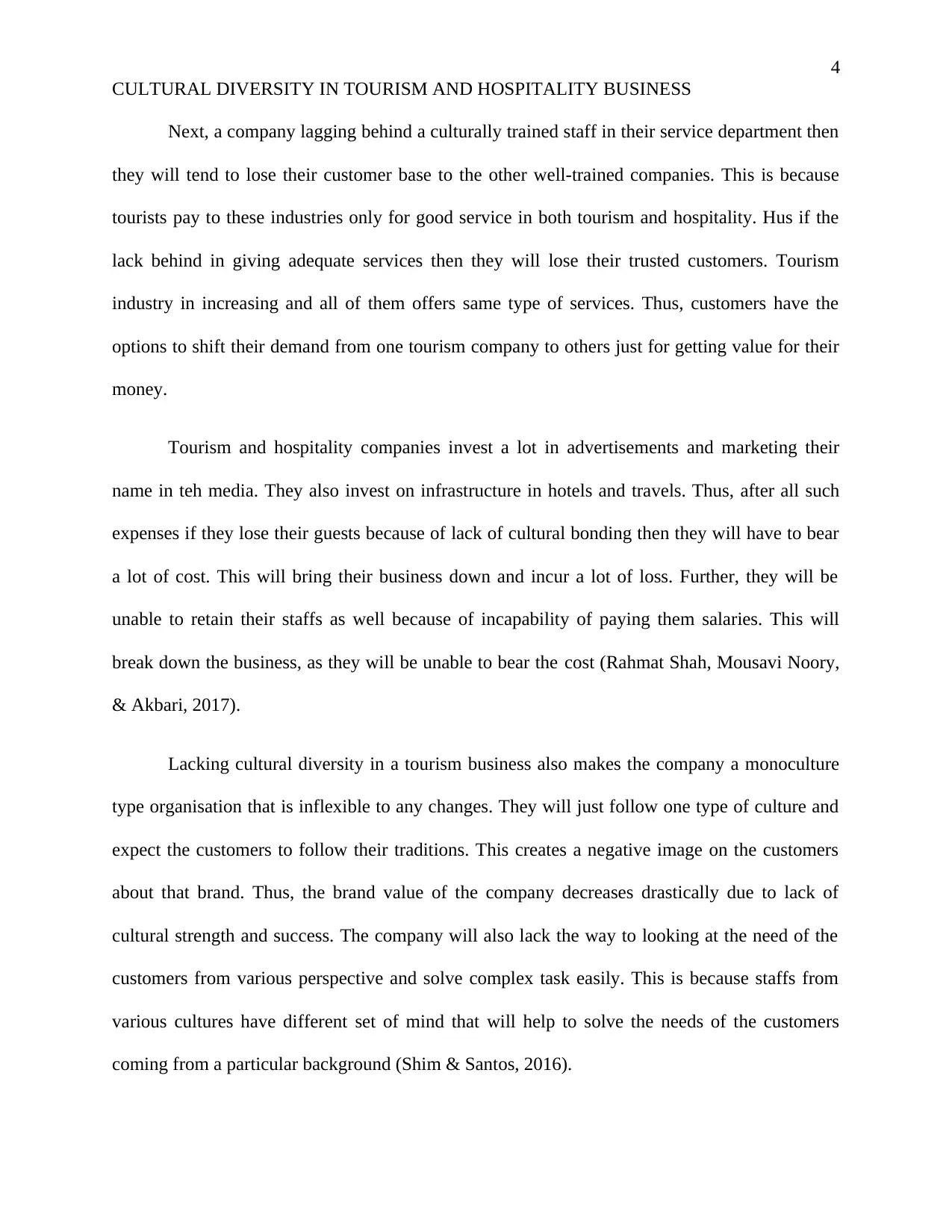
4
CULTURAL DIVERSITY IN TOURISM AND HOSPITALITY BUSINESS
Next, a company lagging behind a culturally trained staff in their service department then
they will tend to lose their customer base to the other well-trained companies. This is because
tourists pay to these industries only for good service in both tourism and hospitality. Hus if the
lack behind in giving adequate services then they will lose their trusted customers. Tourism
industry in increasing and all of them offers same type of services. Thus, customers have the
options to shift their demand from one tourism company to others just for getting value for their
money.
Tourism and hospitality companies invest a lot in advertisements and marketing their
name in teh media. They also invest on infrastructure in hotels and travels. Thus, after all such
expenses if they lose their guests because of lack of cultural bonding then they will have to bear
a lot of cost. This will bring their business down and incur a lot of loss. Further, they will be
unable to retain their staffs as well because of incapability of paying them salaries. This will
break down the business, as they will be unable to bear the cost (Rahmat Shah, Mousavi Noory,
& Akbari, 2017).
Lacking cultural diversity in a tourism business also makes the company a monoculture
type organisation that is inflexible to any changes. They will just follow one type of culture and
expect the customers to follow their traditions. This creates a negative image on the customers
about that brand. Thus, the brand value of the company decreases drastically due to lack of
cultural strength and success. The company will also lack the way to looking at the need of the
customers from various perspective and solve complex task easily. This is because staffs from
various cultures have different set of mind that will help to solve the needs of the customers
coming from a particular background (Shim & Santos, 2016).
CULTURAL DIVERSITY IN TOURISM AND HOSPITALITY BUSINESS
Next, a company lagging behind a culturally trained staff in their service department then
they will tend to lose their customer base to the other well-trained companies. This is because
tourists pay to these industries only for good service in both tourism and hospitality. Hus if the
lack behind in giving adequate services then they will lose their trusted customers. Tourism
industry in increasing and all of them offers same type of services. Thus, customers have the
options to shift their demand from one tourism company to others just for getting value for their
money.
Tourism and hospitality companies invest a lot in advertisements and marketing their
name in teh media. They also invest on infrastructure in hotels and travels. Thus, after all such
expenses if they lose their guests because of lack of cultural bonding then they will have to bear
a lot of cost. This will bring their business down and incur a lot of loss. Further, they will be
unable to retain their staffs as well because of incapability of paying them salaries. This will
break down the business, as they will be unable to bear the cost (Rahmat Shah, Mousavi Noory,
& Akbari, 2017).
Lacking cultural diversity in a tourism business also makes the company a monoculture
type organisation that is inflexible to any changes. They will just follow one type of culture and
expect the customers to follow their traditions. This creates a negative image on the customers
about that brand. Thus, the brand value of the company decreases drastically due to lack of
cultural strength and success. The company will also lack the way to looking at the need of the
customers from various perspective and solve complex task easily. This is because staffs from
various cultures have different set of mind that will help to solve the needs of the customers
coming from a particular background (Shim & Santos, 2016).
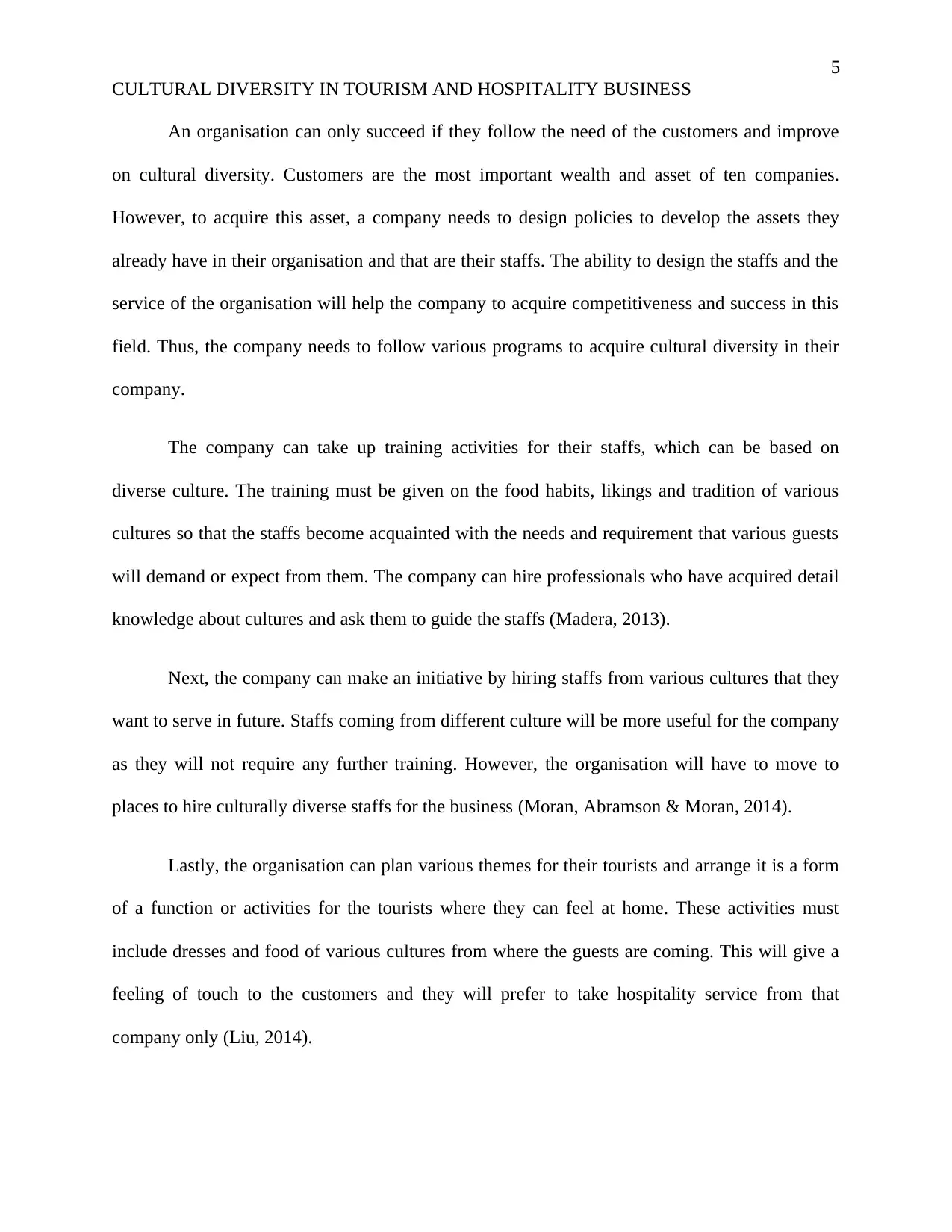
5
CULTURAL DIVERSITY IN TOURISM AND HOSPITALITY BUSINESS
An organisation can only succeed if they follow the need of the customers and improve
on cultural diversity. Customers are the most important wealth and asset of ten companies.
However, to acquire this asset, a company needs to design policies to develop the assets they
already have in their organisation and that are their staffs. The ability to design the staffs and the
service of the organisation will help the company to acquire competitiveness and success in this
field. Thus, the company needs to follow various programs to acquire cultural diversity in their
company.
The company can take up training activities for their staffs, which can be based on
diverse culture. The training must be given on the food habits, likings and tradition of various
cultures so that the staffs become acquainted with the needs and requirement that various guests
will demand or expect from them. The company can hire professionals who have acquired detail
knowledge about cultures and ask them to guide the staffs (Madera, 2013).
Next, the company can make an initiative by hiring staffs from various cultures that they
want to serve in future. Staffs coming from different culture will be more useful for the company
as they will not require any further training. However, the organisation will have to move to
places to hire culturally diverse staffs for the business (Moran, Abramson & Moran, 2014).
Lastly, the organisation can plan various themes for their tourists and arrange it is a form
of a function or activities for the tourists where they can feel at home. These activities must
include dresses and food of various cultures from where the guests are coming. This will give a
feeling of touch to the customers and they will prefer to take hospitality service from that
company only (Liu, 2014).
CULTURAL DIVERSITY IN TOURISM AND HOSPITALITY BUSINESS
An organisation can only succeed if they follow the need of the customers and improve
on cultural diversity. Customers are the most important wealth and asset of ten companies.
However, to acquire this asset, a company needs to design policies to develop the assets they
already have in their organisation and that are their staffs. The ability to design the staffs and the
service of the organisation will help the company to acquire competitiveness and success in this
field. Thus, the company needs to follow various programs to acquire cultural diversity in their
company.
The company can take up training activities for their staffs, which can be based on
diverse culture. The training must be given on the food habits, likings and tradition of various
cultures so that the staffs become acquainted with the needs and requirement that various guests
will demand or expect from them. The company can hire professionals who have acquired detail
knowledge about cultures and ask them to guide the staffs (Madera, 2013).
Next, the company can make an initiative by hiring staffs from various cultures that they
want to serve in future. Staffs coming from different culture will be more useful for the company
as they will not require any further training. However, the organisation will have to move to
places to hire culturally diverse staffs for the business (Moran, Abramson & Moran, 2014).
Lastly, the organisation can plan various themes for their tourists and arrange it is a form
of a function or activities for the tourists where they can feel at home. These activities must
include dresses and food of various cultures from where the guests are coming. This will give a
feeling of touch to the customers and they will prefer to take hospitality service from that
company only (Liu, 2014).
⊘ This is a preview!⊘
Do you want full access?
Subscribe today to unlock all pages.

Trusted by 1+ million students worldwide
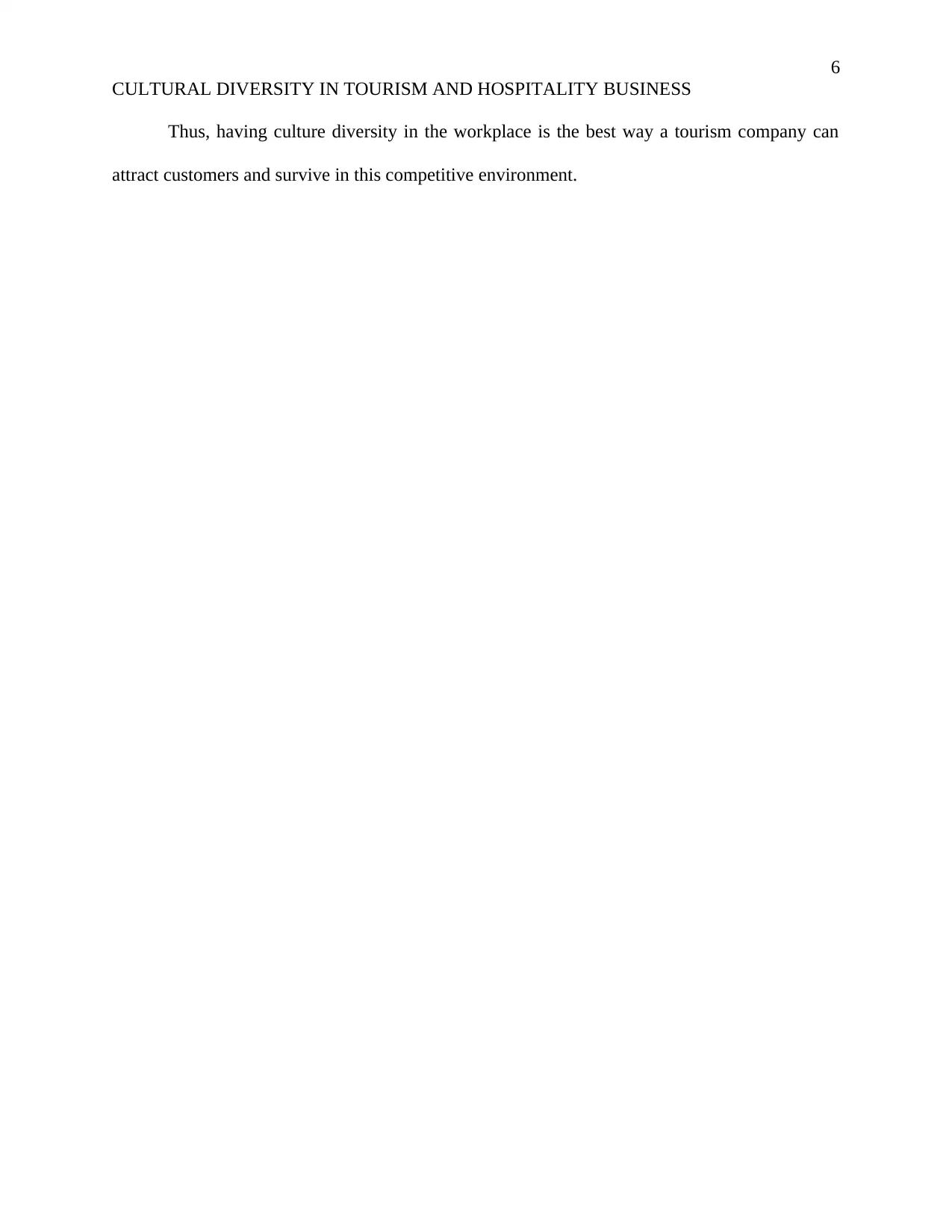
6
CULTURAL DIVERSITY IN TOURISM AND HOSPITALITY BUSINESS
Thus, having culture diversity in the workplace is the best way a tourism company can
attract customers and survive in this competitive environment.
CULTURAL DIVERSITY IN TOURISM AND HOSPITALITY BUSINESS
Thus, having culture diversity in the workplace is the best way a tourism company can
attract customers and survive in this competitive environment.
Paraphrase This Document
Need a fresh take? Get an instant paraphrase of this document with our AI Paraphraser
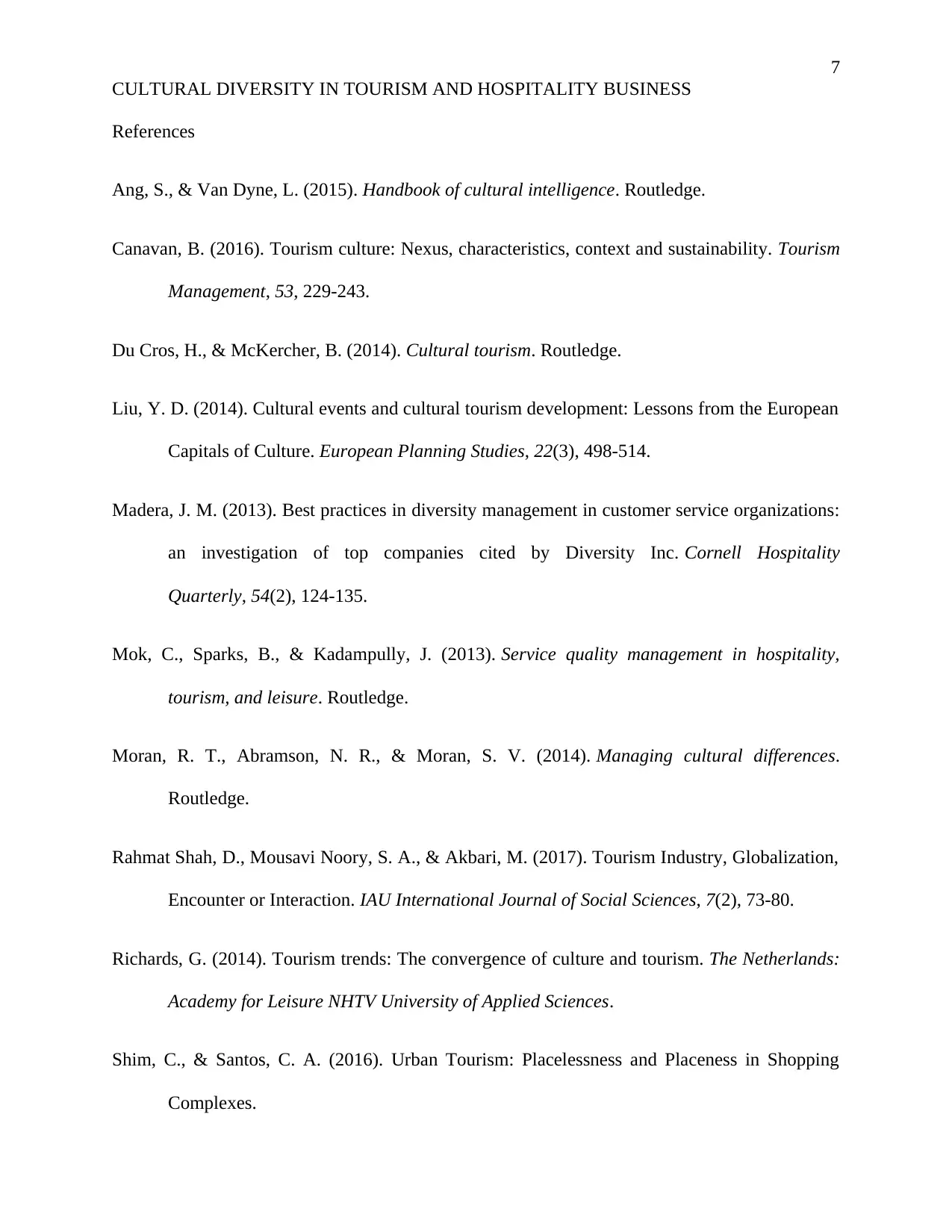
7
CULTURAL DIVERSITY IN TOURISM AND HOSPITALITY BUSINESS
References
Ang, S., & Van Dyne, L. (2015). Handbook of cultural intelligence. Routledge.
Canavan, B. (2016). Tourism culture: Nexus, characteristics, context and sustainability. Tourism
Management, 53, 229-243.
Du Cros, H., & McKercher, B. (2014). Cultural tourism. Routledge.
Liu, Y. D. (2014). Cultural events and cultural tourism development: Lessons from the European
Capitals of Culture. European Planning Studies, 22(3), 498-514.
Madera, J. M. (2013). Best practices in diversity management in customer service organizations:
an investigation of top companies cited by Diversity Inc. Cornell Hospitality
Quarterly, 54(2), 124-135.
Mok, C., Sparks, B., & Kadampully, J. (2013). Service quality management in hospitality,
tourism, and leisure. Routledge.
Moran, R. T., Abramson, N. R., & Moran, S. V. (2014). Managing cultural differences.
Routledge.
Rahmat Shah, D., Mousavi Noory, S. A., & Akbari, M. (2017). Tourism Industry, Globalization,
Encounter or Interaction. IAU International Journal of Social Sciences, 7(2), 73-80.
Richards, G. (2014). Tourism trends: The convergence of culture and tourism. The Netherlands:
Academy for Leisure NHTV University of Applied Sciences.
Shim, C., & Santos, C. A. (2016). Urban Tourism: Placelessness and Placeness in Shopping
Complexes.
CULTURAL DIVERSITY IN TOURISM AND HOSPITALITY BUSINESS
References
Ang, S., & Van Dyne, L. (2015). Handbook of cultural intelligence. Routledge.
Canavan, B. (2016). Tourism culture: Nexus, characteristics, context and sustainability. Tourism
Management, 53, 229-243.
Du Cros, H., & McKercher, B. (2014). Cultural tourism. Routledge.
Liu, Y. D. (2014). Cultural events and cultural tourism development: Lessons from the European
Capitals of Culture. European Planning Studies, 22(3), 498-514.
Madera, J. M. (2013). Best practices in diversity management in customer service organizations:
an investigation of top companies cited by Diversity Inc. Cornell Hospitality
Quarterly, 54(2), 124-135.
Mok, C., Sparks, B., & Kadampully, J. (2013). Service quality management in hospitality,
tourism, and leisure. Routledge.
Moran, R. T., Abramson, N. R., & Moran, S. V. (2014). Managing cultural differences.
Routledge.
Rahmat Shah, D., Mousavi Noory, S. A., & Akbari, M. (2017). Tourism Industry, Globalization,
Encounter or Interaction. IAU International Journal of Social Sciences, 7(2), 73-80.
Richards, G. (2014). Tourism trends: The convergence of culture and tourism. The Netherlands:
Academy for Leisure NHTV University of Applied Sciences.
Shim, C., & Santos, C. A. (2016). Urban Tourism: Placelessness and Placeness in Shopping
Complexes.
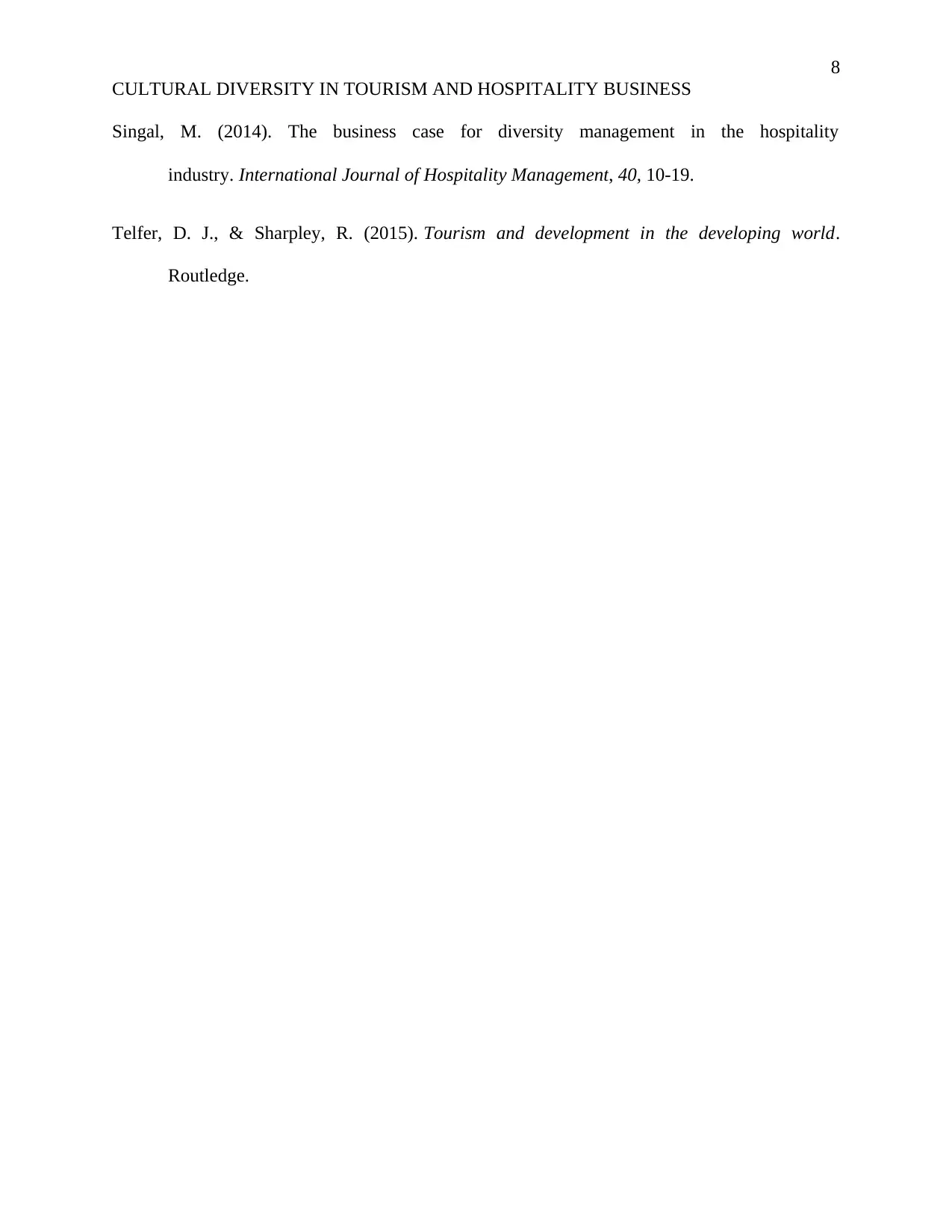
8
CULTURAL DIVERSITY IN TOURISM AND HOSPITALITY BUSINESS
Singal, M. (2014). The business case for diversity management in the hospitality
industry. International Journal of Hospitality Management, 40, 10-19.
Telfer, D. J., & Sharpley, R. (2015). Tourism and development in the developing world.
Routledge.
CULTURAL DIVERSITY IN TOURISM AND HOSPITALITY BUSINESS
Singal, M. (2014). The business case for diversity management in the hospitality
industry. International Journal of Hospitality Management, 40, 10-19.
Telfer, D. J., & Sharpley, R. (2015). Tourism and development in the developing world.
Routledge.
⊘ This is a preview!⊘
Do you want full access?
Subscribe today to unlock all pages.

Trusted by 1+ million students worldwide
1 out of 9
Related Documents
Your All-in-One AI-Powered Toolkit for Academic Success.
+13062052269
info@desklib.com
Available 24*7 on WhatsApp / Email
![[object Object]](/_next/static/media/star-bottom.7253800d.svg)
Unlock your academic potential
Copyright © 2020–2025 A2Z Services. All Rights Reserved. Developed and managed by ZUCOL.





